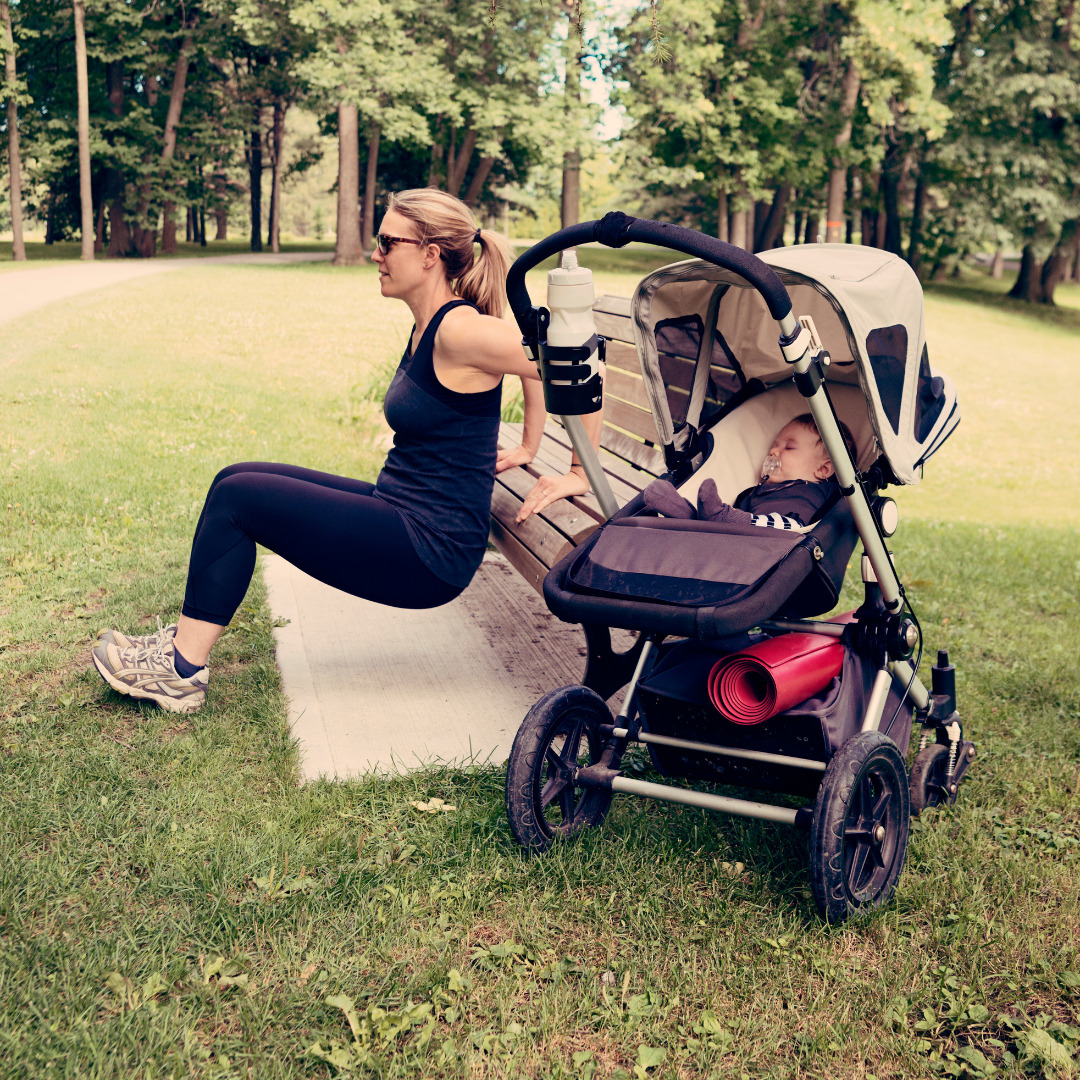Postpartum Care
Book your postpartum check in at an Obria Medical Clinic today.
During the weeks after delivery, many mothers contend with challenges like anxiety, pain, fatigue, and other issues. Postpartum appointments with an obstetrician-gynecologist (OB-GYN), nurse practitioner or midwife provide an opportunity to ensure the well-being of new mothers physically, mentally, and psychologically. Your first postpartum appointment should occur within the first three weeks of delivery. Book an appointment today and let us support you.
What is postpartum care?
Often referred to as the fourth trimester, the postpartum period is a critical time of recovery after childbirth. Encouraging a woman to care for herself during this period is essential for her recovery, overall health, and her ability to care for her newborn.
The American College of Obstetricians and Gynecologists (ACOG) recommends that your first postpartum check in occur within the first three weeks of delivery with additional visits scheduled as needed.1 Even if you are feeling fine, it is still important that you attend your first postpartum appointment.
What occurs during a postpartum check in?
Your first postpartum visit is all about your provider ensuring that you are physically, mentally and psychologically healthy, and that you are recovering at a proper rate.
During your checkup, your provider will give you a pelvic examination to check in on how well you are healing after birth.
They’ll also chat with you to check on whether you are experiencing some common challenges that new moms often face, like feeling down or anxious (which is often an indicator of Postpartum Depression), having difficulty caring for your baby, experiencing poor sleep, fatigue, pain, or a range of other issues.
They may also discuss the emotional side of things with you and offer practical support. If you are worried about things like food, diapers, or resources, they may also address those concerns too.
Obria Medical Clinics specifically offer several additional resources for material support that you may be interested in.
What symptoms may I experience during the postpartum period?
Vaginal Soreness
Due to intense pressure experienced during labor, inflammation, swelling, and vaginal pain is common and may last up to 12 weeks (about 3 months).
If you experienced any vaginal tears or underwent an episiotomy during labor (an incision to perineum to help the baby pass through the vaginal canal), you may also experience pain and be caring for stitches. These wounds usually heal in about ten days with vaginal pain usually subsisting in about 6-12 weeks (about 3 months), but be sure to contact your provider if you are experiencing intense pain or any of the below symptoms, which may indicate infection:
- Fever
- Increased pain
- Increased swelling, redness, or warmth
- Pus discharge
- Strong, unpleasant odor2
Vaginal Discharge
Vaginal discharge is a natural part of the postpartum process. Following the birth of your child, your body will begin to shed the superficial mucous membrane that lined your uterus throughout pregnancy.3 You can expect to have discharge composed of blood clotting and this membrane for a few weeks, which will eventually lighten in amount and color over the span of a month. Invest in sanitary pads during this time.
Afterpains & Contractions
After pains are the cramps and contractions a new mother may experience the first few days post-delivery. This is partially due to the uterus compressing blood vessels to prevent excessive bleeding and the enlarged uterus shrinking back to its original size. Due to the release of Oxytocin, it is common to feel these pains during breastfeeding.4 Over the counter pain medications may help with pain management.
Incontinence
Post delivery, you may find that you have trouble urinating, experience a burning sensation, or are unable to control urination. This inability to control urination is called Incontinence, and it is due to weakness, stretching, or injury to pelvic floor muscles during childbirth. While this will improve in a few weeks, new mothers experiencing incontinence are encouraged to wear sanitary pads and perform Kegel exercises to strengthen the pelvic floor.
Tender Breasts
As a new mother, you may experience something called Breast Engorgement, meaning that your breasts are overly full of milk. This typically occurs within the first few days of giving birth and can last several weeks. Your breasts may feel a few cup sizes larger than usual, tender, swollen, or firm. To prevent pain and potential infection, you must feed your baby frequently, express milk often, and pump as needed. Apply warm and cold compresses, massage your breasts, and take ibuprofen may also help with discomfort. Regarding nipple pain, ensure that your baby is latching on to the breast properly and ask your provider about nipple cream, which may help to alleviate dryness.4
Hair, Skin & Weight Changes
Women typically lose about ten pounds immediately after giving birth and experience additional weight loss within the following weeks, especially if they are breastfeeding. 4 However, some women may find that they are having difficulty with weight loss post-pregnancy, which may cause stress, anxiety, and self-esteem issues.
Beyond healthy eating and asking your provider about returning to exercise and activity, we recommend that you give yourself grace. Your body just underwent a massive process in which you brought new life into the world and is now in a period of recovery. Be kind and patient with yourself. Over time and with consistency, a healthy diet and moderate level of exercise will help you return to your pre-pregnancy weight once you are healed.
You may also find that your hair is thinning in comparison to when you were pregnant, or at times even falling out. This is due to hormonal changes. Your hair should return to its normal fullness in 6 months.
Stretch marks on the skin are also common post-pregnancy due to stretching of the skin during pregnancy and changes in body mass. Beyond being embraced, your stretch marks will likely fade with a combination of time, patience and the application of over-the-counter creams and oils.
Emotional Changes: Postpartum Depression or The Baby Blues?
Know the difference: Postpartum Depression & the Baby Blues
While it is somewhat common to go experience the Baby Blues, know how to identify the warning signs of Postpartum Depression, which you should seek professional help for.
The Baby Blues
It is common for new mothers to experience feelings of sadness within the first few days after giving birth, which is referred to as the baby blues. Usually experienced within the first 2-3 days after giving birth, baby blues is often caused by the steep decline in pregnancy hormones like estrogen and progesterone, which gives rise to mood swings.7 Additionally, many new parents may be navigating personal changes and experience feelings of anxiety as they navigate caring for their newborn, or worry about what this change may mean for their lives. You may find yourself feeling down, impatient, or grumpy, crying for no reason or just generally not yourself. The good news is that the baby blues typically resolves within 2-3 weeks of giving birth. If these feelings do not alleviate, get in contact with a healthcare professional.
Your partner may also experience the Baby Blues.
This typically beginning within the first 3-6 months of parenting, and may cause feelings of sadness, irritability, withdrawal, hopelessness, and feelings of doubt in male partners. This is partially due to a change in hormones in new fathers as testosterone levels drop and estrogen levels rise, in addition to other hormones like cortisol (the stress hormone) increasing.6 If your partner is having trouble coping, encourage them to seek resources for professional help.
Postpartum Depression (PPD)
Postpartum Depression is a more significant issue with a clinical diagnosis. Occurring in 1 in 7 new mothers, Postpartum Depression (PPD) is characterized by intense feelings of sadness, anxiety, fatigue, and hopelessness.5 It typically begins within 1-3 weeks of delivery and requires professional help and medical treatment to resolve.
Postpartum Depression not only affects how you feel, but also how you relate to the world around you and to your baby.
You may find that you feel in a fog, have difficulty bonding with your baby or have little interest in the things that typically interest you. If you are experiencing any symptoms of Postpartum depression, contact your medical provider who can help you to feel better.
If you are experiencing any suicidal thoughts or thoughts of self-harm or harming your baby, contact 911 or call or text the Suicide and Crisis Lifeline at 988.
You are not alone.
Returning to Baseline
Your period, sexual activity & additional pregnancies
When will my period return?
If you are not breastfeeding, you might notice your period returning around 6 to 8 weeks after giving birth. However, if you are breastfeeding, it could be several months before your period resumes. Some women might not experience their menstrual cycle again until they decide to stop breastfeeding.
When your period does make a comeback, it is important to note that it may be different from what you were accustomed to before pregnancy. It could be shorter or longer in duration. But with time, it typically stabilizes and returns to its pre-pregnancy pattern. 7
When can I engage in sexual activity?
Healthcare professionals suggest waiting 4 to 6 weeks after childbirth to allow your body the necessary healing time before resuming sexual activity. When you do decide to engage in sexual activity, exercise caution, as it’s possible to become pregnant even before your menstrual cycle resumes. This is because ovulation, the release of an egg, can occur before your period returns.4
When can I sustain another pregnancy?
Even though your body may be able to support another pregnancy sooner rather than later, it is recommended to wait at least a year and a half before sustaining an additional pregnancy, as lack of time in between pregnancies increases the likelihood of your baby being born prematurely.4
General recommendations for navigating the postpartum period:

Prioritize getting rest and sleep.
Adjusting to your newborn’s feeding schedule can cause sleep deprivation and be a difficult experience, especially when your body needs sleep to recover. Be sure to ask for assistance caring for your newborn from loved ones when you need rest and try to align your sleep with when your baby is sleeping.

Get support from family and friends.
There is an adage that “it takes a village to raise a child.” Receiving practical support from family and friends in the form of cooking, assistance with feeding your newborn, running errands, or helping with childcare can make all the difference during this time. Do not be afraid to lean on loved ones for help – they want to see you succeed.

Eat healthy and return to exercise.
Taking care of yourself allows you to take better care of others. Be sure to eat a nutrient dense diet conducive to healing and breastfeeding and return to exercise when given approval by your healthcare provider. Walking outdoors or exercising will release the feel-good endorphins that you need to find balance as a new parent.
You are supported.
The Postpartum period can be a challenging period to navigate for new parents. We are here to support you in more ways than one and you are not alone. Book your Postpartum appointment at an Obria Medical Clinic near you.
References:
- Ramos, Dr. D. (2022, February). What to expect at a postpartum checkup-and why the visit matters. ACOG. https://www.acog.org/womens-health/experts-and-stories/the-latest/what-to-expect-at-a-postpartum-checkup-and-why-the-visit-matters
- Women’s Care, S. (2023). Vaginal pain after pregnancy: How much is normal?. Vaginal Pain After Pregnancy: How Much Is Normal?: Solace Women’s Care: Obstetrics & Gynecology. https://www.solacewomenscare.com/blog/vaginal-pain-after-pregnancy-how-much-is-normal
- Staff, M. C. (2022, December 6). What moms can expect after a vaginal delivery. https://www.mayoclinic.org/healthy-lifestyle/labor-and-delivery/in-depth/postpartum-care/art-20047233
- Dimes, M. of. (2023, September). Your body after baby: The first 6 weeks. March of Dimes. https://www.marchofdimes.org/find-support/topics/postpartum/your-body-after-baby-first-6-weeks#:~:text=Vaginal%20discharge,less%20and%20lighter%20in%20color.
- Professional, C. C. M. (2022, April 12). Postpartum depression: Causes, symptoms & treatment. Cleveland Clinic. https://my.clevelandclinic.org/health/diseases/9312-postpartum-depression
- Dimes, M. of. (2021, May). Baby Blues after pregnancy. March of Dimes. https://www.marchofdimes.org/find-support/topics/postpartum/baby-blues-after-pregnancy
- Dimes, M. of. (2019, March). Postpartum depression. March of Dimes. https://www.marchofdimes.org/find-support/topics/postpartum/postpartum-depression
